Munchkin: a game that, love it or hate it, has stood the test of time
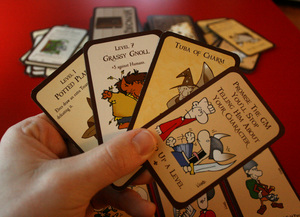
Mike Hulsebus | Contributor
There are plenty of silly card games out there. Every year, game companies put out a huge number of card games that hit the market and vanish into obscurity before the year is through.
Munchkin, on the other hand, is a game franchise that came out in 2001 and still, 10 years later, is going strong. Last year, it brought in $2.6 million dollars for its publisher.
Today we're going to take a look at Munchkin, a lighthearted fantasy card game with cartoony artwork to see what the big deal is. I'm also rolling out a new review scoring system for games to better help you see if you'll want to be welcomed to Munchkin land or if you'll find it as painful an experience as being crushed under a house.
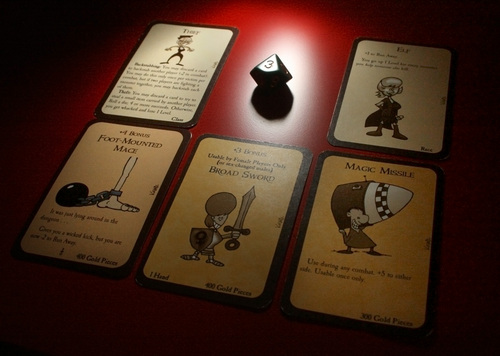
This third level elf thief has already acquired a good set of treasure to her name, but she'll still need help if she runs into the undead horrors that are the Wight Brothers.
Mike Hulsebus | Contributor
We're not going to go through a full rules summary today, but rather look at the sort of things that happen during the game to get a feel for the overall experience rather than how to play.
In Munchkin (no relation whatsoever to The Wizard of Oz by the way), you win by getting your character to level 10. You start out as a level 1 human and get a level for each monster that you kill. You begin the game with a few cards to equip your character, and then the game starts.
Every turn, you're going to turn over a card from the door deck. Sometimes a bad effect may happen to you, sometimes you may get cards you'll get to use later, and other times you'll run into a monster.
When you encounter a monster, you'll figure out your strength by adding your level to all the bonuses your items give you. If your level is high enough to beat it. If you beat it, you gain a level and take its treasure (cards from the treasure deck).
If you can't beat it, you can ask friends for help. Any of the other players can offer to help you kill the monster. They wouldn't gain a level for it, but, depending on what you negotiate, they would split the treasure with you.
This is one of the things that I like about the game — even when it's not your turn, you're still engaged in what's happening since you might be able to jump in and participate in the result of a combat. Most of the cards in the game can be played out of turn, and there are plenty out there to hinder the other players too.
You might, for example, make more difficult for another player to win by playing your Intelligent card on the monster he's fighting, giving it a +10 bonus (but making it worth more treasure if he manages to defeat it).
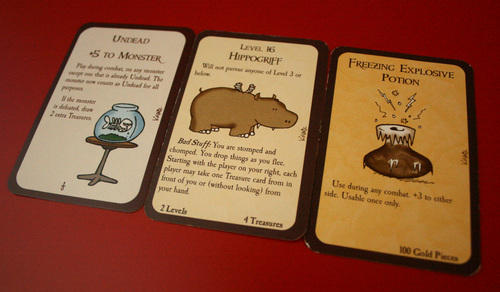
An already tough monster can get tougher when the other players play cards to pump it up.
Mike Hulsebus | Contributor
One of the things that makes the game fun is all of the different situations that can arise. There are a lot of different ways to use your cards and different ways that the cards interact.
You can save a monster to fight yourself, or you could add it to someone else's combat. You could make a monster more difficult so it defeats your opponent, or you could make one of the monsters you're fighting more difficult so that you get extra treasure. You could make your opponent's monster disappear to rob him of treasure and a kill, or you could save it to pull yourself out of a tight spot.
If you're female and have an item you can't use (e.g. The Gentleman's Club), you could sell it, you could trade it for a different item, or you could save it to bribe a player, saying, "I'll give you this item if you agree not to help in this combat." Each character is also a little different thanks to classes and races that bestow special abilities and change monster's reactions to you.
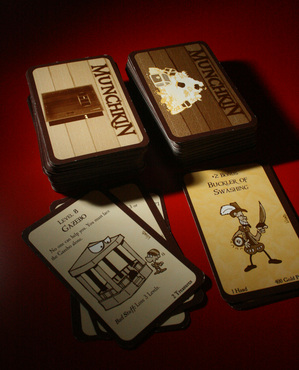
Mike Hulsebus | Contributor
The main problem with the game is that, well, it's random. You could start out as a Dwarf Wizard and get items that don't offer you any combat bonuses or that only an Elf can use, rendering you so weak that you can't help anyone in combat to gain stuff that will make you stronger. Similarly, you might be one level away from winning and go turn after turn without getting a monster to fight for the win.
Most games end up close, but it's entirely possible for someone to get left behind and be effectively out of the game. I can see how this would be bothersome for someone, especially when the game can take up to an hour to play: People often want more control over what happens to them in a game of that length.
I think what keeps people coming back to Munchkin its it's light-hearted fantasy theme that basically tells you "don't take this game too seriously." If this were a theme-less game where I was a Green 2 with a +1 card and fighting a card that was a red 8 and got an extra +2 against any Green players, that would be boring, I wouldn't want to play it, and I would feel powerless.
But there's something amusing about fighting a Gazebo or someone making the houseplant you're fighting a Rabid Houseplant that kills you. The game is full of jokes and references, many (but not all) of them playing off common Dungeons and Dragons tropes.
If you don't really connect with these, I can see how the game could be hard to get into for you and might as well be the theme-less game I described. Still, pun lovers will still get a chuckle out of a lot of these.
For those that hate Munchkin, I can see why you could find reason to hate it. I actually hadn't played Munchkin recently because one friend of my mine had a bad experience being held forcibly by social necessity while playing hours of Munchkin against her will.
That's fine, let's play a different game. I don't expect that everyone will like this game, but it's one that I'm glad to have recently rediscovered. Sure, sometimes I want to spend my gaming time moving resource cubes on a map in some deeply strategic way, but other times it's more fun to just play a silly card game with little downtime and good player interaction.
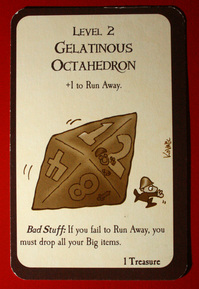
Mike Hulsebus | Contributor
Grades
Starting with this review and going forward, I will invite people that I've played the game with to give the game a letter grade to better give you a feel for what people other than me think about the game. If they so choose, they're also able to add in a thought. I collect the grades over email so that people aren't influenced by what they've heard other people say.
Brian: A
Simple with enough variation to make you think
Demoree: B+
Angie B+
Val: B+
It's a great game for someone who gets all the geeky references and it has some replay value, but isn't that profound overall.
Jake: B+
Half-elf/half-halfling wizard/thief with a Chainsaw vs. a Tiny, Intelligent Bullrog and a Leprechaun.
Me: B+
Rob: B I like it and would play it anytime someone suggested it, but it's not a game that I'd buy or want to tell all my friends about.Allie: C- Boring and trite, but could be engaging after a few Red Bull-vodkas.
Mike Hulsebus has enough variation to make you think but isn't that profound overall. He can be reached at mikehulsebus@gmail.com.


Comments
Sarah Rigg
Mon, Feb 28, 2011 : 9 p.m.
I like the grade idea. I give Munchkin an A-, though it also depends on which version you're playing. So far, I like classic best, though Munchkin Chthulu has some great/terrible puns.
AnnArborSpartan
Mon, Feb 28, 2011 : 4:15 p.m.
If you love Munchkin (like my friends and I do) you will probably also like Munchkin Quest which adds actual dungeon tiles and gold and roaming monsters. We completely lost track of time playing MQ this weekend!!!